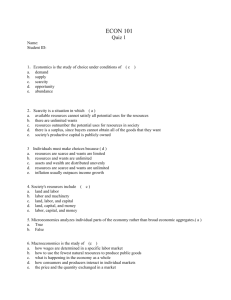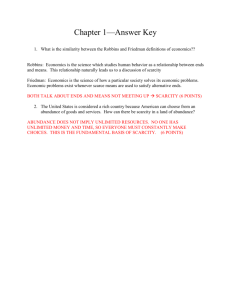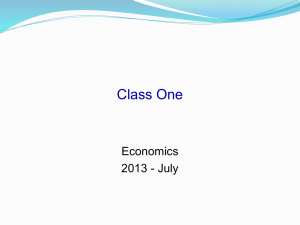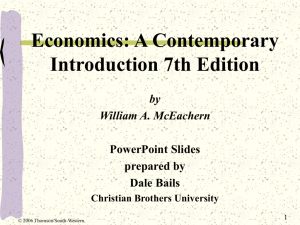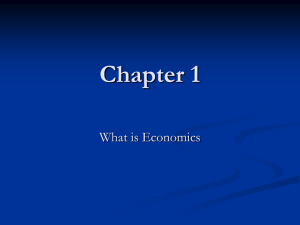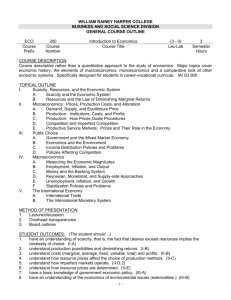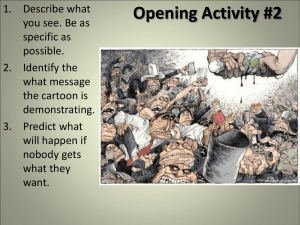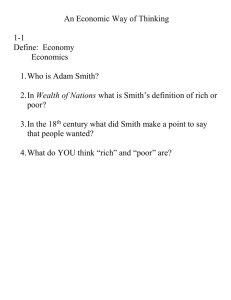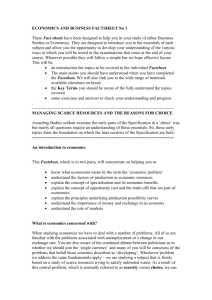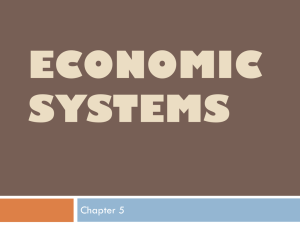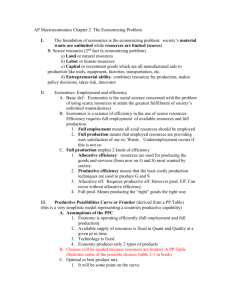Definitions Economic Fallacies Scarcity
advertisement
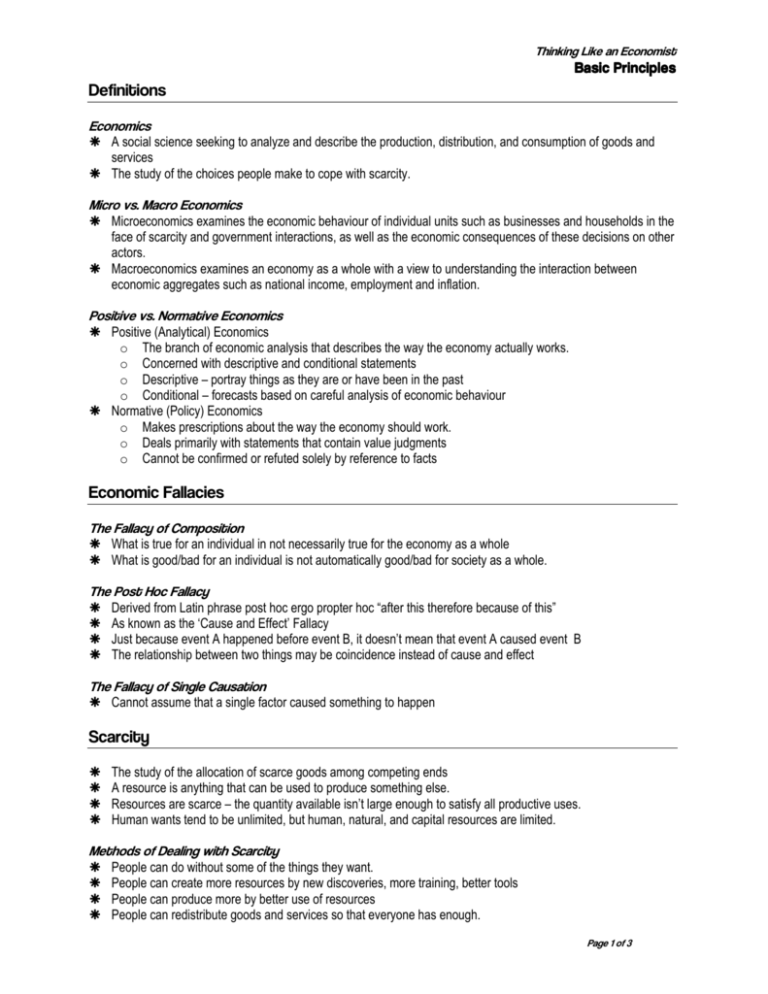
Thinking Like an Economist Basic Basi c Principles Definitions Economics A social science seeking to analyze and describe the production, distribution, and consumption of goods and services The study of the choices people make to cope with scarcity. Micro vs. Macro Economics Microeconomics examines the economic behaviour of individual units such as businesses and households in the face of scarcity and government interactions, as well as the economic consequences of these decisions on other actors. Macroeconomics examines an economy as a whole with a view to understanding the interaction between economic aggregates such as national income, employment and inflation. Positive vs. Normative Economics Positive (Analytical) Economics o The branch of economic analysis that describes the way the economy actually works. o Concerned with descriptive and conditional statements o Descriptive – portray things as they are or have been in the past o Conditional – forecasts based on careful analysis of economic behaviour Normative (Policy) Economics o Makes prescriptions about the way the economy should work. o Deals primarily with statements that contain value judgments o Cannot be confirmed or refuted solely by reference to facts Economic Fallacies The Fallacy of Composition What is true for an individual in not necessarily true for the economy as a whole What is good/bad for an individual is not automatically good/bad for society as a whole. The Post Hoc Fallacy Derived from Latin phrase post hoc ergo propter hoc “after this therefore because of this” As known as the ‘Cause and Effect’ Fallacy Just because event A happened before event B, it doesn’t mean that event A caused event B The relationship between two things may be coincidence instead of cause and effect The Fallacy of Single Causation Cannot assume that a single factor caused something to happen Scarcity The study of the allocation of scarce goods among competing ends A resource is anything that can be used to produce something else. Resources are scarce – the quantity available isn’t large enough to satisfy all productive uses. Human wants tend to be unlimited, but human, natural, and capital resources are limited. Methods of Dealing with Scarcity People can do without some of the things they want. People can create more resources by new discoveries, more training, better tools People can produce more by better use of resources People can redistribute goods and services so that everyone has enough. Page 1 of 3 Thinking Like an Economist Basic Basi c Principles Opportunity Cost The most highly valued sacrificed alternative; the value of the "next-best" choice. Opportunity cost is the value of the benefits of the foregone alternative, of the next best alternative that could have been chosen, but was not. Another way to look at it is that "choosing is refusing;" one choice can only be accepted by refusing another. Incentives Economics is the study of incentives: how people get what they want or need, especially when other people want or need the same thing An incentive is a means of urging people to do more of a good thing and less of a bad thing An incentive is anything that offers rewards to people who change their behavior. Three basic kinds of incentives: o Economic (What’s it worth to me?) o Social (Will society act in a bad way if I do this thing?) o Moral (Is it the right thing to do?) o Often all three are combined Efficiency Vs. Equity An economy is efficient if it takes all opportunities to make some people better off without making other people worse off. Efficiency means society gets the most that it can from its scarce resources. Equity means that everyone gets his or her fair share. Since people can disagree about what’s “fair,” equity isn’t as well-defined a concept as efficiency. Equity means the benefits of those resources are distributed fairly among the members of society. Productive Resources Anything that can be sued to create or manufacture valuable resources Tangible resources have physical properties that can be seen and touched Raw Materials Labour Real Capital (facilities, machinery, equipment) Intangible resources lack physical properties Knowledge Entrepreneurship Environment for enterprise Production Questions What to produce? How to produce it? For whom to produce? Page 2 of 3 Thinking Like an Economist Basic Basi c Principles Economic Systems An economic system is the set of laws, institutions and common practices that help a nation determine how to use its scarce resources to satisfy as many needs and wants as possible. The Traditional Economy Manner of production and the goods produced are the same as in the past Each family produces what they need Surplus goods are traded or bartered Today these societies are in very remote areas (ex: Bedouin in the Sahara Desert) The Command Economy All production decisions are made by political leaders Productive resources are owned by the state Individuals have the obligation of working for the state Ex: Cuba, USSR Market Economy (Free Enterprise) Economic activity is coordinated by many individuals who make indep. Decisions in a free market place. What will be produced- determined by consumer demand How goods are produced- determined by profit goals For whom goods are produced- determined by people’s income Canada: A Mixed Economy We have a modified market economy Both private enterprise and state owned enterprise Private property and crown land Individual choice and a public ‘safety net’ through government programs and supports Page 3 of 3

